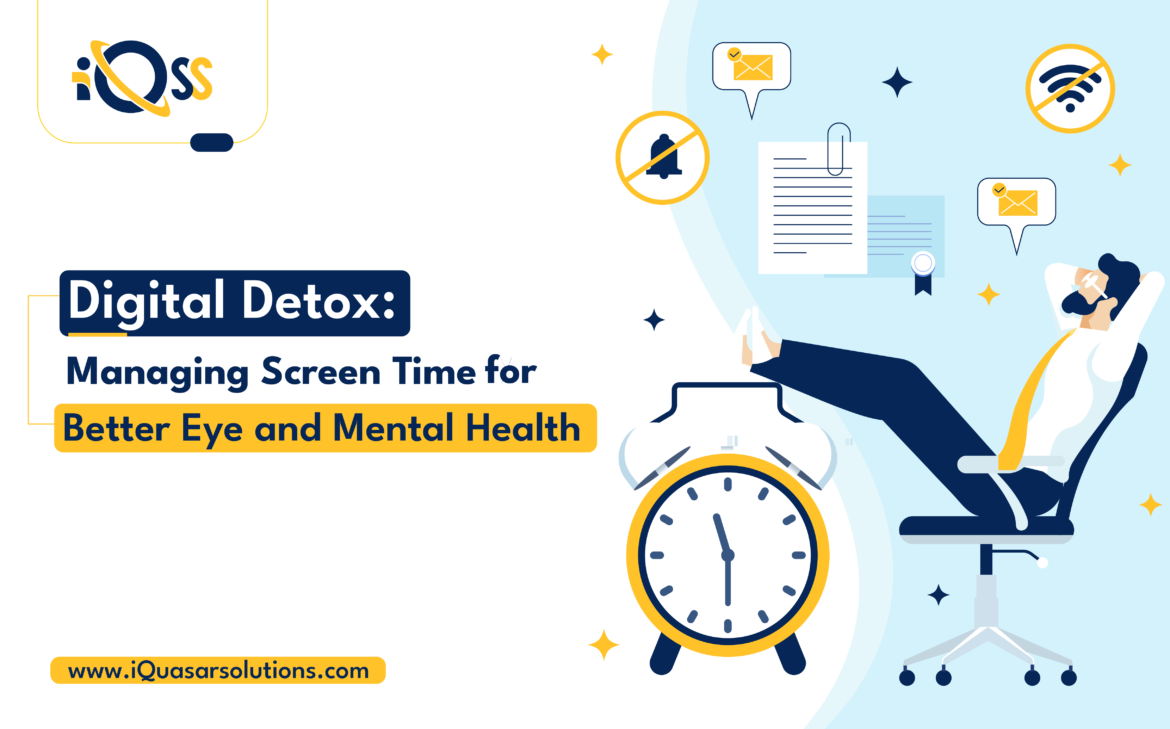In an era of digitalization, our digital screens have become stable companions from work to our personal lives. However, with digital dependency comes a need for a considerate and systematic approach to screen time management. Excessive exposure to screen time through any device has been associated with various challenges that impact the betterment of the eye and the well-being of mental health.
The Harmful Impacts of Excessive Screen Time:
Excessive screen time has a wide range of adverse impacts on eye health and mental well-being. Overuse of digital screens leads to eye strain, irritation, and uneven sleep patterns due to excessive exposure to blue light. A sedentary lifestyle, along with extreme screen use, can lead to physical health issues such as obesity and poor posture. The continuous connection with digital devices is linked to mental health issues such as anxiety and depression. In this blog, we will explore some ideas to help you effectively manage the amount of time you spend on screen to secure your eye and mental health.
Strategies for Effective Screen Time Management for Better Eyes and Mental Health:
1. Set Boundaries:
Setting boundaries is crucial for managing screen time effectively. Establish specific time limits for activities involving screens, such as work, leisure, and social media. Clearly define periods when screens should be avoided, especially before bedtime, to promote better sleep. Setting boundaries helps prevent excessive screen exposure, reducing eye strain and mental fatigue.
2. Prioritize Purposeful Screen Time:
Be intentional about the time spent on screens by prioritizing purposeful activities. Identify and prioritize tasks requiring screen use, such as work-related responsibilities, educational pursuits, or meaningful leisure activities. Minimize mindless scrolling or excessive gaming, as these activities can contribute to mental fatigue. Prioritizing purposeful screen time ensures that each moment spent on a screen serves a specific, meaningful purpose.
3. Utilize “Do Not Disturb” Features:
The “Do Not Disturb” feature becomes essential with all the alarms going out around us. You provide yourself the ability to recover unbroken concentration by turning on this feature. By reducing distractions, you may use your devices more thoughtfully and productively by turning off your notifications.
4. Explore Offline Activities:
Embracing offline activities to break the digital chain by getting out of the digital maelstrom is essential for overall health. Incorporate offline activities into your daily routine to give your eyes and mind the much-needed break they require. Going outdoors, taking a walk, or learning a new pastime are all great ways to vary your
interests and lessen the eye stress and mental fatigue associated with spending excessive time in front of a
computer.
Positive Impacts of Strategic Screen Time Management:
Setting aside time to carefully track your screen usage not only saves your eyes but also improves your mental and physical health. Let’s examine the several benefits:
1. Reduced Eye Strain and Fatigue:
Strategic screen time management involves implementing practices to minimize prolonged exposure to digital screens, reducing the risk of eye strain and fatigue. Consciously limiting the duration of screen time, taking regular breaks, and following an efficient schedule can reduce the stress on the eyes. Minimized eye strain leads to improved eye health and decreased symptoms like dryness, unclear vision, and inconvenience associated with excessive screen use.
2. Improved Sleep Quality:
Organizing screen time strategically, especially during bedtime, positively impacts the quality of sleep. Decreasing screen time throughout the day and before bedtime helps an individual to naturally prepare for sleep, leading to a comfortable and uninterrupted sleep and enhanced sleep quality. Improved sleep quality has various advantages, including conscious functions, mood regulation, and overall well-being.
3. Enhanced Focus and Productivity:
By putting careful screen habits into practice, focus and productivity can be increased significantly. Cutting down on digital distractions in your life encourages concentration and speeds up work completion in both your personal and professional life.
In conclusion, adopting a digital detox strategy to manage screen time is hard for promoting better eye and mental health in our technology-driven society. Reducing screen time allows for more meaningful social interactions, increased outdoor activities, and enhanced mindfulness. Breaking the cycle of constant digital engagement provides opportunities for relaxation, creativity, and mental rejuvenation. It promotes a feeling of control over an individual’s technology usage, which prevents potential negative impacts on eyes and mental well-being, such as digital addiction and information overload. By giving importance to well-being and implementing conscious screen habits, we can enjoy the benefits of technology while safeguarding our physical and mental health for a more fulfilling and sustainable future.
